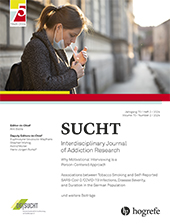Umsetzung, Akzeptanz und Auswirkungen der Tabaksteuererhöhung in Deutschland vom 1.Januar 2002
Abstract
Fragestellung: Effekte der Tabaksteuererhöhung vom 1.1.2002. <BR> Methodik: Befragung repräsentativer Stichproben vor und nach der Erhöhung; Analyse von Daten zur Menge versteuerter Zigaretten. <BR> Ergebnisse: Die Tabaksteuererhöhung wurde nicht komplett an die Verbraucher weitergegeben. 65 Raucher (4,7 %) haben wegen der Erhöhung das Rauchen aufgegeben, 11,5 % haben den Konsum reduziert. Die Anzahl konsumierter Zigaretten reduzierte sich um 1,33 % (Preiselastizität: -0,46 für Zigaretten aus Automaten). Auf Basis der Daten zur Menge versteuerter Zigaretten ergibt sich eine Preiselastizität von -0,28. </P><P> Schlussfolgerungen: Bei Rauchern ist eine kognitive Auseinandersetzung mit dem Rauchverhalten und eine behaviorale Modifikation des Rauchens festzustellen.
Aims: To study the effects of the increase in tobacco tax in Germany.<BR> Method: Before and after the increase in tobacco tax, representative samples were assessed. Furthermore, official data on taxation of tobacco products was analysed. </P><P> Results: The increase of tobacco tax was passed on only partly to the consumer. 65 smokers (4.7 %) stopped smoking, and 11.5 % reduced the number of cigarettes they smoked. The average number of cigarettes smoked was decreased by 1.33 % (the price elasticity was -0.46 for cigarettes from vending machines). On basis of data on the amount of taxes paid on cigarettes, a elasticity of -0.28 was estimated. </P><P> Conclusions: In smokers, the small increase in the price of cigarettes resulted in significant reflections on their smoking and actual modification of their smoking behaviour.



